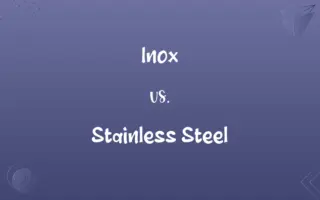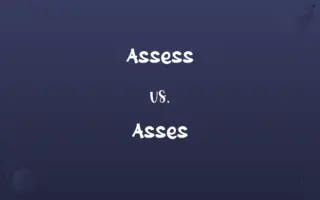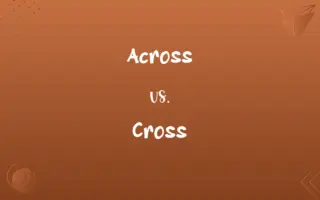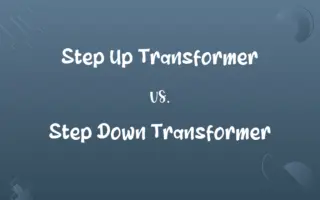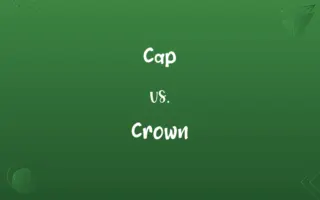Shall vs. Can: Know the Difference

By Shumaila Saeed || Published on January 1, 2024
"Shall" implies obligation or future action, while "Can" indicates ability or permission.
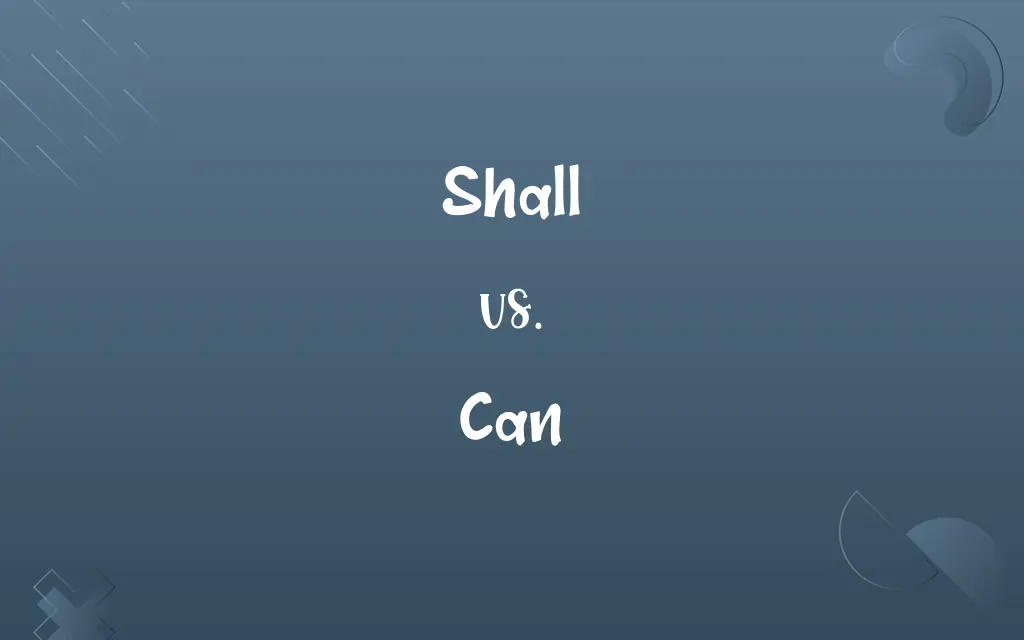
Key Differences
"Shall" is often used to express a strong intention or determination, particularly in formal or legal contexts. "Can," on the other hand, is used to express the ability or capacity to do something, reflecting potential or practicality.
Shumaila Saeed
Jan 01, 2024
In legal documents, "shall" is used to denote a mandatory action or requirement, suggesting a duty or obligation. Conversely, "can" is employed to indicate possibility or permission, often in everyday language to express what is feasible or allowed.
Shumaila Saeed
Jan 01, 2024
"Shall" is used in formal settings, such as in official rules or guidelines, to state what is expected or planned. "Can," however, is more informal and is widely used in casual conversation to describe what someone is capable of doing.
Shumaila Saeed
Jan 01, 2024
In questions, "shall" can imply a suggestion or offer, as in "Shall we go?" In contrast, "can" in questions often seeks permission or explores ability, as in "Can I help you?"
Shumaila Saeed
Jan 01, 2024
"Shall" tends to have a more future-oriented implication, suggesting something that is going to happen. "Can," however, is more present-oriented, dealing with current abilities or permissions.
Shumaila Saeed
Jan 01, 2024
ADVERTISEMENT
Comparison Chart
Usage Context
Formal, legal, and official
Informal and everyday conversation
Shumaila Saeed
Jan 01, 2024
Implication
Obligation, intention, future action
Ability, possibility, permission
Shumaila Saeed
Jan 01, 2024
Question Form
Suggestions, offers (e.g., "Shall we dance?")
Seeking permission, ability (e.g., "Can I go?")
Shumaila Saeed
Jan 01, 2024
Common in
Legal documents, formal proposals
Casual speech, inquiries about capability
Shumaila Saeed
Jan 01, 2024
ADVERTISEMENT
Shall and Can Definitions
Shall
"Shall" is used to express a future action or intention.
I shall start the project tomorrow.
Shumaila Saeed
Dec 16, 2023
Can
"Can" is used to express ability or capacity.
I can speak three languages.
Shumaila Saeed
Dec 16, 2023
Shall
"Shall" is used in legal contexts for obligations.
The tenant shall pay the rent monthly.
Shumaila Saeed
Dec 16, 2023
Shall
"Shall" suggests a formal proposal or suggestion.
Shall we arrange a meeting next week?
Shumaila Saeed
Dec 16, 2023
ADVERTISEMENT
Can
"Can" denotes practical or physical capability.
She can lift heavy weights.
Shumaila Saeed
Dec 16, 2023
Shall
"Shall" indicates a formal or mandatory requirement.
You shall submit the report by Friday.
Shumaila Saeed
Dec 16, 2023
Shall
"Shall" can imply a strong determination or promise.
We shall overcome these challenges.
Shumaila Saeed
Dec 16, 2023
Can
An airtight container, usually made of tin-coated iron, in which foods or beverages are preserved.
Shumaila Saeed
Dec 13, 2023
Shall
Used before a verb to indicate the simple future tense in the first person singular or plural.
I shall sing in the choir tomorrow.
I hope that we shall win the game.
Shumaila Saeed
Dec 13, 2023
Shall
Used similarly to indicate determination or obligation in the second and third persons singular or plural.
(determination): You shall go to the ball!
(obligation): Citizens shall provide proof of identity.
Shumaila Saeed
Dec 13, 2023
Shall
Used in questions with the first person singular or plural to suggest a possible future action.
Shall I help you with that?
Shall we go out later?
Let us examine that, shall we?
Shumaila Saeed
Dec 13, 2023
Can
To seal in an airtight container for future use; preserve
Canning peaches.
Shumaila Saeed
Dec 13, 2023
Can
(Slang) To make a recording of
Can the audience's applause for a TV comedy show.
Shumaila Saeed
Dec 13, 2023
Can
To put an end or stop to
Canned the TV show after one season.
Told the students to can the chatter.
Shumaila Saeed
Dec 13, 2023
Can
To solicit cash donations for a charity or other organization such as a club or amateur sports team by holding out a can or other container in a public place.
Shumaila Saeed
Dec 13, 2023
Can
To know how to; to be able to.
She can speak English, French, and German.
I can play football.
Can you remember your fifth birthday?
Shumaila Saeed
Dec 13, 2023
Can
May; to be permitted or enabled to.
You can go outside and play when you're finished with your homework.
Can I use your pen?
Shumaila Saeed
Dec 13, 2023
Can
(modal auxiliary verb, defective) To have the potential to; be possible.
Can it be Friday already?
Teenagers can really try their parents' patience.
Animals can experience emotions.
Shumaila Saeed
Dec 13, 2023
Can
Used with verbs of perception.
Can you hear that?.
I can feel the baby moving inside me.
Shumaila Saeed
Dec 13, 2023
Can
To preserve by heating and sealing in a jar or can.
They spent August canning fruit and vegetables.
Shumaila Saeed
Dec 13, 2023
Can
To discard, scrap or terminate (an idea, project, etc.).
He canned the whole project because he thought it would fail.
Shumaila Saeed
Dec 13, 2023
Can
(transitive) To cover (the fuel element in a nuclear reactor) with a protective cover.
Shumaila Saeed
Dec 13, 2023
Can
A more or less cylindrical vessel for liquids, usually of steel or aluminium, but sometimes of plastic, and with a carrying handle over the top.
Shumaila Saeed
Dec 13, 2023
Can
A container used to carry and dispense water for plants (a watering can).
Shumaila Saeed
Dec 13, 2023
Can
A tin-plate canister, often cylindrical, for preserved foods such as fruit, meat, or fish.
Shumaila Saeed
Dec 13, 2023
Can
A chamber pot, now a toilet or lavatory.
Shit or get off the can.
Bob's in the can. You can wait a few minutes or just leave it with me.
Shumaila Saeed
Dec 13, 2023
Can
(slang) Jail or prison.
Bob's in the can. He won't be back for a few years.
Shumaila Saeed
Dec 13, 2023
Can
(nautical) A cube-shaped buoy or marker used to denote a port-side lateral mark
Shumaila Saeed
Dec 13, 2023
Can
An obs. form of began, imp. & p. p. of Begin, sometimes used in old poetry. [See Gan.]
With gentle words he can faile gree.
Shumaila Saeed
Dec 13, 2023
Can
A drinking cup; a vessel for holding liquids.
Fill the cup and fill can,Have a rouse before the morn.
Shumaila Saeed
Dec 13, 2023
Can
A vessel or case of tinned iron or of sheet metal, of various forms, but usually cylindrical; as, a can of tomatoes; an oil can; a milk can.
Shumaila Saeed
Dec 13, 2023
Can
To know; to understand.
I can rimes of Rodin Hood.
I can no Latin, quod she.
Let the priest in surplice white,That defunctive music can.
Shumaila Saeed
Dec 13, 2023
Can
To be able to do; to have power or influence.
The will of Him who all things can.
For what, alas, can these my single arms?
Mæcænas and Agrippa, who can most with Cæsar.
Shumaila Saeed
Dec 13, 2023
Can
To be able; - followed by an infinitive without to; as, I can go, but do not wish to.
Yet he could not but acknowledge to himself that there was something calculated to impress awe, . . . in the sudden appearances and vanishings . . . of the masque
Tom felt that this was a rebuff for him, and could not but understand it as a left-handed hit at his employer.
Shumaila Saeed
Dec 13, 2023
Can
The fleshy part of the human body that you sit on;
He deserves a good kick in the butt
Are you going to sit on your fanny and do nothing?
Shumaila Saeed
Dec 13, 2023
Can
Terminate the employment of;
The boss fired his secretary today
The company terminated 25% of its workers
Shumaila Saeed
Dec 13, 2023
Can
"Can" refers to the possibility of something happening.
It can rain later today.
Shumaila Saeed
Dec 16, 2023
Can
"Can" is used in casual requests or questions.
Can you help me with this task?
Shumaila Saeed
Dec 16, 2023
Repeatedly Asked Queries
What does "shall" mean?
"Shall" implies obligation or intention, often in a formal context.
Shumaila Saeed
Jan 01, 2024
Can "can" be used in formal writing?
"Can" is more informal, but it can appear in formal contexts for clarity.
Shumaila Saeed
Jan 01, 2024
Does "can" imply future or present ability?
"Can" mostly refers to present ability or permission.
Shumaila Saeed
Jan 01, 2024
Is "shall" mandatory or suggestive?
"Shall" is generally mandatory, especially in legal contexts.
Shumaila Saeed
Jan 01, 2024
Can "can" indicate potential?
Yes, "can" often indicates that something is possible.
Shumaila Saeed
Jan 01, 2024
Is "shall" used in questions?
Yes, especially in formal contexts or for polite suggestions.
Shumaila Saeed
Jan 01, 2024
Is "shall" still commonly used?
"Shall" is less common in everyday speech but prevalent in formal or legal writing.
Shumaila Saeed
Jan 01, 2024
Can "shall" be used to make offers?
Yes, "shall" can be used in questions to make offers or suggestions.
Shumaila Saeed
Jan 01, 2024
Is "shall" more British English?
"Shall" is more common in British English but understood in American English.
Shumaila Saeed
Jan 01, 2024
Can "can" and "may" be used interchangeably?
They are similar, but "may" is more formal and specific to permission.
Shumaila Saeed
Jan 01, 2024
What does "can" signify?
"Can" expresses ability, possibility, or permission.
Shumaila Saeed
Jan 01, 2024
Is "can" appropriate for seeking permission?
Yes, "can" is commonly used to ask for or give permission.
Shumaila Saeed
Jan 01, 2024
Are "shall" and "will" interchangeable?
Not always; "shall" is more formal and sometimes more obligatory than "will."
Shumaila Saeed
Jan 01, 2024
Is "shall" common in American legal documents?
Yes, "shall" is frequently used in American legal contexts.
Shumaila Saeed
Jan 01, 2024
Can "can" be informal?
Yes, "can" is typically more informal and conversational.
Shumaila Saeed
Jan 01, 2024
How is "can" used in questions?
"Can" is used to inquire about ability or to request permission.
Shumaila Saeed
Jan 01, 2024
Is "shall" imperative?
In legal and formal contexts, "shall" often carries an imperative tone.
Shumaila Saeed
Jan 01, 2024
Do "shall" and "should" have the same meaning?
No, "should" implies recommendation or advice, while "shall" is more about obligation.
Shumaila Saeed
Jan 01, 2024
Are "shall" and "can" similar in any way?
They can be similar in suggesting future actions, but their tones and contexts differ.
Shumaila Saeed
Jan 01, 2024
Can "can" be replaced with "able to"?
Often, "can" can be substituted with "able to" for ability.
Shumaila Saeed
Jan 01, 2024
Share this page
Link for your blog / website
HTML
Link to share via messenger
About Author
Written by
Shumaila SaeedShumaila Saeed, an expert content creator with 6 years of experience, specializes in distilling complex topics into easily digestible comparisons, shining a light on the nuances that both inform and educate readers with clarity and accuracy.
























